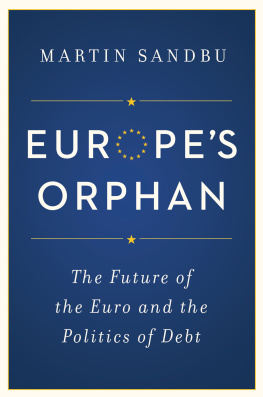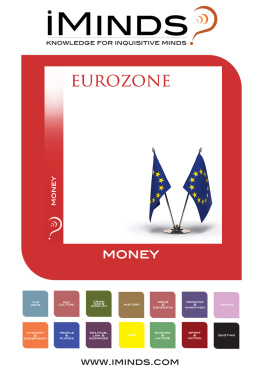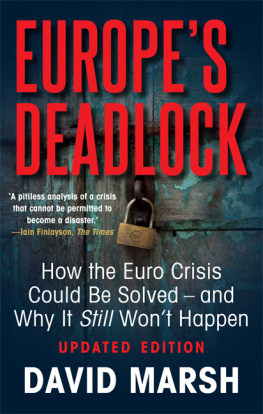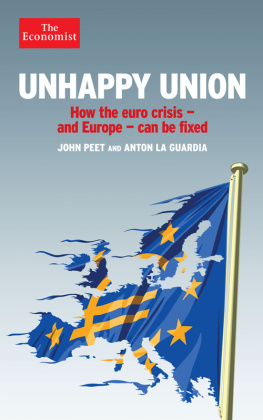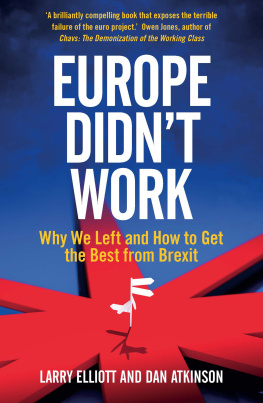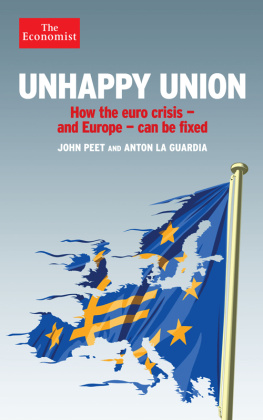
Europes Orphan
EUROPES ORPHAN
The Future of the Euro and the Politics of Debt
MARTIN SANDBU
PRINCETON UNIVERSITY PRESS
PRINCETON AND OXFORD
Copyright 2015 by Martin Sandbu
Requests for permission to reproduce material from this work should be sent to Permissions, Princeton University Press
Published by Princeton University Press,
41 William Street, Princeton, New Jersey 08540
In the United Kingdom: Princeton University Press,
6 Oxford Street, Woodstock, Oxfordshire OX20 1TW
press.princeton.edu
Jacket design by Faceout Studio
All Rights Reserved
ISBN 978-0-691-16830-2
Library of Congress Control Number: 2015944893
British Library Cataloging-in-Publication Data is available
This book has been composed in Adobe Garamond Pro by T&T Productions Ltd, London
Printed on acid-free paper
Printed in the United States of America
10 9 8 7 6 5 4 3 2 1
To Ana
CONTENTS
Economic Tragedy |
Whatever It Takes |
Greater Guernsey? |
PREFACE
I MOVED FROM EUROPE to the United States a few months before the euro became the common money of eleven proud, old, nation states. I returned to work in the Financial Timess London office in January 2009, shortly before the single currency was hit by a crisis that was dramatic in its own right and would be turned into an existential one by a series of tragic policy mistakes. If I had felt a little twinge of sadness at watching Europes grand monetary experiment only from a distance in its first, seemingly successful, decade, I was granted a ringside view of the near-death experience that followed. For five years I wrote the FTs editorials about the eurozone sovereign debt crisis, in the course of which I gained the insights and developed the views that appear in the following pages. (These views, to be clear, should not be attributed to the FT but are mine alone.)
There are many people without whom this book would not have come about.
The most important is my wife Ana Marambio, whose simple question Why dont you write your book now? at a stroke made everything possible. She supported me taking time off work, provided the space that any creative effort requires, and met the inevitable frustrations along the way with the tolerance and patience of a true life partner. I dedicate Europes Orphan to her.
Two colleagues at the FT have been and continue to be particularly influential on my thinking and writing. One is David Gardner, who first recruited me to the paper and with whom I had the pleasure and privilege to work very closely in the leader-writing team. I could write at length about Davids deep knowledge, exceptional clear-sightedness and beautiful writing, but I will sum it up simply by saying that he taught me what good journalism is. Then there is Martin Wolf, who is so much more than an economics commentator and with whom every conversation is illuminating. Martins willingness to engage with my ideas over the years is testimony to both his intellectual open-mindedness and his personal generosity.
I owe a great deal to the FT more broadly, and in particular to Lionel Barber, its editor. Not only did he entrust me with the job of being the papers economics leader writer during the global financial crisis, but his acquiescence to my going on leave in 201314 allowed me to concentrate on the book project. Thanks also to James Lamont, the managing editor, and John Thornhill, the deputy editor, for facilitating my leave. The FTs decision to put me in charge of a new daily economics newsletter upon my return has kept my ideas about the euro sharp. Regular readers of Martin Sandbus Free Lunch will no doubt recognise many of the ideas in the following pages.
Once I had decided to write the book, I had the good fortune that Sophie Lambert from Conville & Walsh wanted to represent me. A wonderful agent, she believed in the project from when it was little more than a sentence-long statement of a provocative idea. She has been the encouraging supporter that makes such a difference for a writer throughout the process including when, during much of 2014, it seemed the eurozone crisis and any interest in a book about it had become things of the past.
A grant from the Norwegian governments Finansmarkedsfondet provided crucial financial support during my book leave, and I want to record my deep gratitude for the help. In the context of this support I gave several presentations to policy communities in Norway, which helped me formulate early ideas. I thank Morten Staude and Birger Vikren for making this possible, and seminar participants at the Ministry of Finance and Norges Bank for their comments.
The book could not have found a better home than Princeton University Press. Everyone on the publishing team and it really has the inclusive spirit of a team has been impeccably professional and helpful. My editor Sarah Caro in particular has been tireless. She edited the first version of the manuscript with that elusive combination of firmness and tact the book is much better as a result. Caroline Priday, Hannah Paul, Kathleen Cioffi and Andrew DeSio have all helped to bring the project from idea to reality, and then into public consciousness. The great professionalism of Sam Clark and Ellen White at T&T Productions has made the production process smoother than I ever thought it could be.
Dan Devroye, Catherine Fieschi, Philippe Legrain and my FT colleagues Tim Harford, Robin Wigglesworth and Giles Wilkes all read parts of the book and provided great feedback. Princeton also received five anonymous reviews of the manuscript. The reviewers encouragements and comments made for a greatly improved final text. I am very grateful to everyone who gave their time to reading (sometimes rough) drafts.
I have been fortunate to learn from a large number of people. Among other FT colleagues, Id like to mention fellow leader writers Chris Cook, Jonathan Ford, Ferdinando Giugliano, Peggy Hollinger and Alison Smith; economics editor Chris Giles; and the fabulous corps of European correspondents including Tony Barber, Anne-Sylvaine Chassany, Kerin Hope, Quentin Peel and Peter Spiegel. It is impossible to list all those who have enhanced my understanding in meetings at the FT or across Europe over the years since the crisis started. But even if I inevitably leave some people out, I would like to thank the politicians, officials, journalists and observers who have shared their views with me and who include Peter Altmeier, Gudmundur Arnason, Jrg Asmussen, Michel Barnier, Bertrand Benoit, Lorenzo Bini-Smaghi, Henrik Bjerre-Nielsen, Claire Brosnan, Marco Buti, Jos Manuel Campa, Nikos Chrysoloras, Panicos Demetriados, Hugo Dixon, Bertrand Dumont, Matthew Elderfield, Henrik Enderlein, Jonathan Faull, Marcel Fratzscher, Otto Fricke, Vitor Gaspar, Tim Geithner, Jos Manuel Gonzlez Pramo, Charles Grant, Megan Greene, Daniel Gros, Ulrike Gurot, Luis de Guindos, Chantal Hughes, Steffen Kampeter, Martin Kotthaus, Bruno Maes, Neil McMurdo, Nikolaus Meyer-Landrut, Mario Monti, John Mourmouras, Dan Mulhall, lvaro Nadal, Nikos Nanopoulos, Jon Nicolaisen, Simon Nixon, Michael Noonan, Simon OConnor, ystein Olsen, Giorgos Papaconstantinou, Alfredo Pastor, Ken Rogoff, Elena Salgado, Andrea Sangiovanni, Wolfgang Schuble, Matina Stevis, Jan Strupczewski, Simon Tilford, Jean-Claude Trichet, Shahin Valle, Herman Van Rompuy, Nicolas Vern, Norman Walter, Jens Weidmann, Thomas Westphal, Thomas Wieser, Guntram Wolff and Jeromin Zettermeyer.
I am only one of millions who have been transfixed by the eurozone crisis and the increasingly desperate politics of bringing it under control. But my personal vantage point is somewhat rare. There is a sense in which I, born and bred in Norway and a Norwegian citizen, have no dog in this fight. Norway has twice plumped for contented self-disenfranchisement outside the councils where Europes future is made or unmade but at least that gives it a claim to impartiality. At the same time, my family ancestry is from what Timothy Snyder calls the European Bloodlands; my mother was born in Poland to a Polish father and a Ukrainian mother, who had met in forced labour in Nazi Germany. That background brings with it a visceral understanding of what European unification or its failure means. I know in my bones how much the European project matters.
Next page
